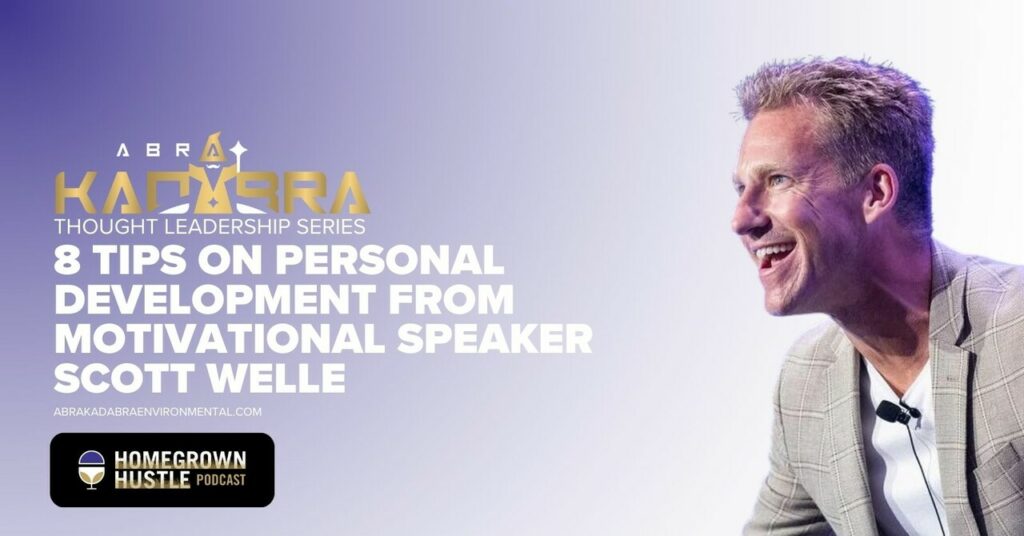How can someone with a fear of public speaking become a motivational speaker? That’s the story of the bestselling author, speaker, and performance coach, Scott Welle. Scott’s story started in a simple town in Albany, Minnesota, where he was born and raised.
Growing up, Scott was really interested in sports and psychology, consecutively. He finished his undergraduate degree in psychology from the University of Wisconsin, Madison. After finishing his undergraduate degree, he decided to move on and take his master’s degree in sports psychology. Sports psychology, for a background, is the psychology of working with elite, professional-level athletes.
The Correlation of Sports Psychology and Business Leadership
After years of spending time in the field of psychology, Scott has decided to move on and take his personal ventures to the next level. Now, Scott is working as a motivational speaker and doing performance coaching for C-suite executives, sales leaders, and entrepreneurs.
Now, let’s take a look at how Scott transitioned from Sports Psychology to Motivation Speaking:
“Sports psychology is just like life psychology,” Scott said. He explained that sports psychology is just more specialized for athletes.
After his master’s degree, Scott was working along with athletes at different levels. However, it became more apartment to him that on a daily basis, he was actually speaking to friends and people who wanted to climb up the corporate ladder or start their own business.
He realized that, so many of the skills and principles that athletes use to dominate their field of play are the same things that will allow people to achieve their best in their career or business.
“Athletes go through the same things that allow us to be our best, that’s being able to handle failure and micro failure and all the different things that come along and how to go through it is consistent effort.”
8 Personal Development Tips For Business Leaders
Now that we have discussed Scott’s transition from Sports Psychology to Motivational Speaking, let’s explore his tips on how to overcome personal challenges and become the best version of yourself.
Adapting to Change
Firstly, it’s adapting to change. Scott mentioned that the universal concern that he hears from his clients is that they are going through a lot of change. He said that most people are hoping they can live their lives in a perfect and comfortable way where nothing is changing and everything is predictable.
He said, “Instead of having that mentality or that outlook on things, let’s actually think about how we can embrace some of the changes that are going on, how we can put our best foot forward, and see the opportunity that may exist from them.”
Outperforming the Norm
Secondly, it is to outperform the norm. He demonstrates, “I think the true mark of an outperformer is someone who achieves greatness and performs at a high level—how they actually perform when the deck is stacked against them or when things aren’t going their way.”
Challenges can be regular occurrences, especially in our personal lives and businesses, but Scott believes that the key to thriving in the midst of change, pressure, stress, and adversity is to accept them and learn to thrive from them.
Mastering Self-Awareness
Thirdly, it’s mastering self-awareness. It might be easier said than done, but this is the key to winning sports, business, and life. Scott explains how he is always pushing forward into people to get into tune with mastering self-awareness for their daily lives.
“Once you have self-awareness, you can actually take action steps to make some changes. You know where you’re currently at, and that awareness allows you to understand the starting point.”
“If you can clearly identify your destination, you can be able to fill in your personal gaps.”
Turning Stutter Into Power
Growing up, Scott Welle was a shy kid. All the way through grade school, Scott spent years and years in speech therapy. He gave us a flashback that when he was kid, he would sit in the back of the classroom and whenever the teacher would ask a question, he would put his head down because he didn’t want the teacher to call him. So anytime he would have to speak in front of a group or in his class, he was really terrified.
On his entrepreneurial journey, Scott started off as a writer, but he noticed some limitations to this, such as not being able to let people know who he was. One of his self-limiting beliefs is who’s going to read his book. But once he got over it, he would think about how every author had to start with their first word on their book to just put it out there. What’s the worst that can happen?
Once he started to put out a couple of books, opportunities came rushing in. He was always being asked to speak about his books in groups. That started off as something that is non-profitable. “I was doing a lot of free speaking engagements early on and was barely paying the bills. So it wasn’t really about a financial paycheck, but it was really about the mental and the emotional paycheck.”
Then, he noticed how speaking impacts many people in a very short period of time. He started to think about how he could grow as a professional speaker and do it on a high level. Now, Scott is already 9 years in the professional speaking business.
Overcoming Imposter Syndrome
Starting a certain level of elevation can come with self-doubts. Self-doubt that is commonly known as imposter syndrome. It’s when you start questioning yourself and your capabilities. It happens especially when you want to reach a level of achievement to be ingrained into people’s minds. It’s when you want to regularly seek validation from the work that you do.
As human beings, we all have some fears, doubts, and insecurities, which can manifest in different areas of our lives.
- Comparing ourselves to others—We often compare our current struggles to other people’s successes. On the other hand, we don’t get to see when these people are struggling their way to success.
- The Effect of Social Media—In many ways, Social Media can be an extension of our lives. We portray a version of ourselves, highlighting parts that we only want people to see.
The bottom line is, that things that come along with the imposter syndrome drive you to continue to work hard because you don’t want to be mediocre and complacent. You don’t want people to perceive you as a “bag of tricks.”
“Feeling like an imposter is normal, but what outperformers do is they continue to take action. Despite some of those fears, insecurities, worries, self-doubts, etc. They don’t stop.”
Eliminating Comparison
A lot of times, we compare ourselves to others. Scott emphasizes how it is an unwinnable game. He explains that having imposter syndrome is emotional. Most of the time, it is not logical. Now, the solution to overcome that is to get out of that emotional part of your brain and start to write down all the accomplishments you’ve had. That’s a way of making a logical counterargument to imposter syndrome.
What is the Dunning-Kruger Effect?
According to Britannica, The Dunning-Kruger effect, in psychology is a cognitive bias where people with limited knowledge or competence in a given subject overestimate their own knowledge relative to their peers or people in general.
This psychological effect, for instance, results in individuals pushing themselves to their limits and not letting themselves get paralyzed from taking action. Ignorance is sometimes bliss; in that sense, optimism can lead people to face situations more positively, and overconfidence can help them achieve even unrealistic goals. It may be paradoxical, but in simple ways, this effect can be used as leverage.
Scott recalls a time when he was just at a coffee shop, deciding what his company would be like. He said, “I just remember like literally thinking about, I wonder what I want my company to be. And for whatever reason, it just, oh, it was like the ringing epiphany voice from God or something that was like, I’ll outperform the norm.”
That’s how it came to be for him. He believes that the norm is a baseline that many people go by, and they’re only okay with just being. In contradiction, being able to separate oneself from a pack is a big differentiator that allows one to excel.
Scott quotes Teddy Roosevelt, who said, “Comparison is a thief of joy.” He explains how ego and comparison can prevent one from focusing on one’s personal capabilities. However, he also said that it’s okay to compare yourself to others because that’s what makes us human. The mastery part of that is to use comparison as a competitive advantage and how to lean into that to show up every day and become the best version of yourself.
Putting Continuous Improvement in Mind
In life and in sports, there’s always a winner and a loser. Most of the things that we are like a game but we should know who we are competing against. And sometimes, the best way to approach it is knowing that you are competing with yourself. At the end of the day, you’re playing an infinite game and whether you hit or missed anything, does it matter? For a certain degree, yes. Scott said,” We’re playing an infinite game that is different than the four years of maybe playing college baseball like it’s, it’s a game that continues to go. And if you actually approach it.” Life is just a set of failures but life goes on, and there’s always room for improvement.
As a bonus, Scott also gave us valuable lessons on how to overcome performance gaps.
Extra Tips from Scott:
- Focus on your personal objectives
- Focus on the things you can control: The activities, actions, behaviors, tasks, and others
- Doing things with intention and purpose
- Setting a purpose or good vision
- Going out there and continuing excellence despite of any obstacles, barriers, and distractions
By doing these things, you are empowering yourself to overcome obstacles and reach a point where you’re more fulfilled and happy doing things.
Wrapping It Up
There are countless ways to improve yourself, but it is always up to you how to go about it. Now that we have discussed different tips on how to become the best version of yourself, it’s time for you to re-assess and reflect on the areas in which you can improve. This applies to different types of people: individuals, leaders, dreamers, etc. Apply these tips to your career or business, and see how you can take your attempt to outperform the norm.
If you want to get in touch with Scott Welle, you can visit his website at scottwelle.com
Abra Kadabra Environmental Services is proud to share the wisdom of business owners from our community through our thought leadership series. If you’d like to be featured, click here.
Listen to the Full Podcast
Watch the Video on YouTube







